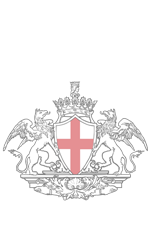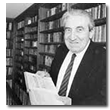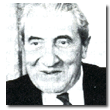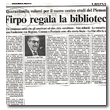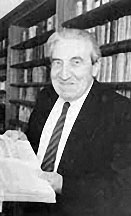
(Turin, Jan. 4, 1915 – Turin, March 2, 1989)
Luigi Firpo studied humanistic subjects at the Massimo d'Azeglio Secondary School in Turin and received a Law degree in 1937, under the supervision of Gioele Solari. His thesis was on the philosophy of Tommaso Campanella. His treatise on the Calabrian philosopher, published in 1939, was the first of a long series of books that he wrote during his lifetime. These publications were the result of his untiring research, his patient study of archives and tomes, his philological reconstruction of texts, and his interpretative analysis.
Following his initial studies of Campanella, Luigi Firpo's interests focused on the culture and political philosophy that emerged between the Renaissance and Counter-Reformation periods. He studied Machiavelli, Botero, Guicciardini, Bruno, Leonardo da Vinci, Boccalini, Savonarola, Pucci, Erasmus, Gallileo, Martin Luther, Agostini, Moro and Francken. He was also interested in the Enlightenment Era of Beccaria and Pagano, as well as Marx, Croce, Nitti, and Einaudi, who he considered his "ideal teacher". Based on these studies, he wrote hundreds of scientific treatises, articles, essays, books and editions (Luigi Firpo's works are listed in Bibliografia degli scritti di Luigi Firpo, 1931-1989, prepared by E. Baldini and F. Barcia, and in Studi politici in onore di Luigi Firpo, prepared by S. Rota Ghibaudi and F. Barcia, Milan, FrancoAngeli, 1990, vol. IV, pages 564-789). His works, which quickly brought him international fame, discussed the link between ethics and politics, exploring, on one hand, the unorthodox nonconformity of exiles and heretics, the striving vision of utopians, the energy of reformers and, on the other hand, Machiavellian realism, reasons of State, and Tacitism.
A professor of history and political doctrine between 1946 and 1985 in Turin, Luigi Firpo taught Law up until 1969 and then went on to teach in the new School of Political Sciences. His untiring work as a scholar, which also aimed to define the foundations and methods of the discipline, led him to launch and supervise far-reaching projects such as the "Classics of Political Thinking", the "The History of Political, Economic and Social Ideas", which was published in eight volumes by Utet (Turin), "Utopians" published by Guida (Naples), "Corpus Reformatorum Italicorum" published by Sansoni (Florence), and national editions of the works of Beccaria and Campanella. In 1968 he was one of the founders of "Il Politico" magazine. He deeply loved the Piedmont region and was the heir of a secular and socially committed culture. Luigi Firpo was a refined writer and brilliant polemist. In the last two decades of his life, he assiduously wrote articles for magazines and newspapers, especially for "La Stampa" newspaper in which he wrote the "Cattivi pensieri" [Bad Thoughts] column. In 1980 he was appointed to the Board of Directors of RAI TV, the Italian national broadcasting company, a job he held until 1987 when he was elected member of the Italian parliament as an independent in the lists of the Italian Republican Party. The valuable library that he created with the passion of a collector and the rigor of a scholar is the most eloquent demonstration of a life entirely dedicated to scientific research and cultural activities.
Luigi Firpo was an excellent bridge player and also wrote several books on the game. He was Italian champion several times (absolute, couples, mixed teams) and was on the Italian team for years. He was also the editor-in-chief of the "Bridge d'Italia" magazine and President of the Federazione Italiana Gioco Bridge (Italian Bridge Federation) between 1970 and 1978.
Based on information from the website www.fondazionefirpo.it

